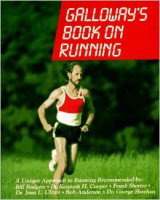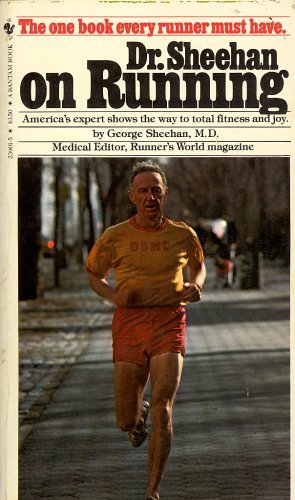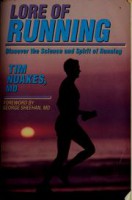When I started running, back in the days before the Internet, most of what I learned about running that didn’t come from sweat came from books.
Three of the books I read early on have remained on my bookshelf ever since. These books taught me the essentials of what I needed to know about running, training, and racing, and they helped me understand some of the reasons why I run.
 Jeff Galloway’s Book on Running is still the book I recommend to anyone who wants to start running. The book is based on the training principles of Arthur Lydiard, which have held up remarkably well while other fads come and go. Galloway presents them in a friendly manner that anyone, no matter how fast or slow, can use. His book helped me set up a training routine that still forms the basis for what I do today. The most important thing I took from Galloway was the focus on the long run, in particular the longer-than-race-distance long run, even (especially) during marathon training, and the use of walking breaks as a useful tool to help those of us who are less gifted survive those extra-long runs (and eventually, ultramarathons).
Jeff Galloway’s Book on Running is still the book I recommend to anyone who wants to start running. The book is based on the training principles of Arthur Lydiard, which have held up remarkably well while other fads come and go. Galloway presents them in a friendly manner that anyone, no matter how fast or slow, can use. His book helped me set up a training routine that still forms the basis for what I do today. The most important thing I took from Galloway was the focus on the long run, in particular the longer-than-race-distance long run, even (especially) during marathon training, and the use of walking breaks as a useful tool to help those of us who are less gifted survive those extra-long runs (and eventually, ultramarathons).
 George Sheehan is the original philosopher-king of running. Running and Being was the first book of his I read, and it’s still my favorite. It contains what is probably Sheehan’s most famous quote, “Each of us is an experiment of one.” His books were the first to focus on the spiritual side of running, but in a completely grounded and practical way. Sheehan is an inclusive elitist. All he demands is that you do what everyone can – strive to do your best, because that’s how you, “discover the wholeness, the unity that everyone seeks.”
George Sheehan is the original philosopher-king of running. Running and Being was the first book of his I read, and it’s still my favorite. It contains what is probably Sheehan’s most famous quote, “Each of us is an experiment of one.” His books were the first to focus on the spiritual side of running, but in a completely grounded and practical way. Sheehan is an inclusive elitist. All he demands is that you do what everyone can – strive to do your best, because that’s how you, “discover the wholeness, the unity that everyone seeks.”
 Tim Noakes’ massive tome Lore of Running attempts, in more than 800 pages (the edition I have – the current one weighs in at over 900), to cover every last detail that you might ever need to know about the science behind how your body reacts to running and training. It’s long and often dry, but there are liberal doses of history and commentary to help pass the time and make the book enjoyable. Anyone who’s obsessive about the details of their running (for example, someone who ended up writing a book called Overthinking the Marathon) will find a kindred spirit in Noakes, and his book to be a worthy read.
Tim Noakes’ massive tome Lore of Running attempts, in more than 800 pages (the edition I have – the current one weighs in at over 900), to cover every last detail that you might ever need to know about the science behind how your body reacts to running and training. It’s long and often dry, but there are liberal doses of history and commentary to help pass the time and make the book enjoyable. Anyone who’s obsessive about the details of their running (for example, someone who ended up writing a book called Overthinking the Marathon) will find a kindred spirit in Noakes, and his book to be a worthy read.
Each one of these books is authoritative in its own way, but still encourages the essential process of taking that information out on the road, trying different things, and figuring out what works for you, even when that sometimes means failing. Their age shows up in some of the details, but even the outdated brand-specific info is good as a history lesson, or at least a quick laugh.
Most books from pre-Amazon days of the first running boom (including the one mass-market success, Jim Fixx’s The Complete Book of Running), went out of print in a relatively short time, but these three are still available today, a testament to their lasting value.
